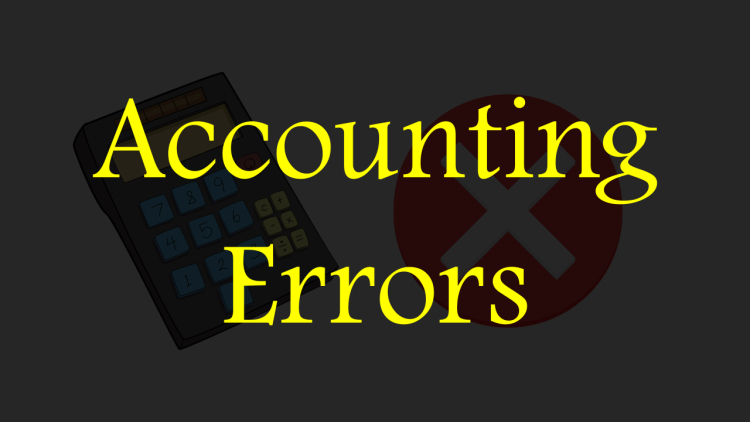Do All Accountants Need to Handle BRS and Bookkeeping Errors or Is It Done by CA Offices?
accounting errors, accounting errors ca, accounting errors pdf, accounting errors cpa, accounting errors cma, accounting errors acca, errors in accounting, accounting errors notes, fixing accounting errors, accounting errors class 11, accounting errors in hindi, accounting error, accounting errors definition, some common accounting errors, how to prevent accounting errors accountant, inventory errors accounting, how to prevent accounting errors, accounting errors in trial balance

Introduction: Clearing the Confusion in Accounting Roles
If you're just stepping into the world of accounting or trying to understand how business finance works, you might often wonder: Do all accountants need to handle Bank Reconciliation and bookkeeping errors? Or is that work mainly done by Chartered Accountant (CA) offices during audits?
This blog will break down these doubts clearly, helping you understand the differences in roles between company accountants and CA firms. Whether you're a student, a fresher, or a business owner trying to set up your accounting system, this guide is for you.
The Foundation: What Is Bookkeeping vs. Auditing?
Before we get to the roles, it’s important to understand two pillars:
-
Bookkeeping is the day-to-day recording of financial transactions. This includes sales, purchases, payments, receipts, cash entries, bank entries, journal entries, etc.
-
Auditing is the process of examining those financial records to ensure they are correct, legal, and reflect the true financial health of the business.
Bookkeeping = Daily Work | Auditing = Periodic Checking
Now let’s see how this connects with Bank Reconciliation (BRS) and error correction.
What Exactly Is Bank Reconciliation (BRS)?
Bank Reconciliation is the process of comparing the cash book maintained by the business with the bank statement provided by the bank. If there's a mismatch, that difference is analyzed and adjusted.
This is a routine but critical task to ensure no transaction is missed, wrongly recorded, or fraudulent.
The Big Question: Who Does This Work?
Let’s understand this based on three levels of accounting responsibility.
Level 1: Junior Accountant or Bookkeeper (In-House Staff)
-
Main Task: Daily entries, cash book maintenance, sales/purchase recording
-
Responsibility: Yes, they are responsible for creating the first draft of BRS
-
Error Handling: They fix basic mismatches, missing entries, wrong dates, etc.
A well-trained accountant will reconcile accounts monthly and keep proper documentation.
So yes, every accountant must know how to handle BRS and fix mistakes in bookkeeping.
Level 2: Senior Accountant or Internal Finance Head
-
Main Task: Review the work of junior staff, approve reconciliations, and finalize monthly reports
-
Responsibility: Yes, they oversee if the BRS was done correctly
-
Error Handling: They handle complex errors, timing mismatches, or cash flow issues
This level ensures the books are clean before they go for audit.
Level 3: Chartered Accountant (CA) or Audit Firm
-
Main Task: Independent verification of the accounts
-
Responsibility: No, they are not responsible for daily reconciliation or basic errors
-
Error Handling: They check if BRS was performed correctly and highlight any uncorrected or suspicious issues
Their role is to verify, not to maintain or clean up books. If errors are found during the audit, they report them — they don't fix them.
So, What’s the Answer?
Yes, accountants are required to handle BRS and bookkeeping corrections. This is a part of their core responsibility.
CA offices do not do routine error-fixing. Their job is to audit and report. If you wait for a CA to find errors in your books, it's already too late.
Why This Misunderstanding Exists
Many beginners think CA offices do everything because they issue final reports. But they don’t realize:
-
CA offices work on a limited-time basis
-
They rely on the books maintained by the internal staff
-
Errors in BRS or books delay the audit process and increase costs
The cleaner the books, the easier the audit.
Real-Life Example
Let’s say you work in a company, and you forget to enter a cheque that was deposited.
-
Your cash book shows Rs. 1,00,000
-
Bank statement shows Rs. 1,20,000
As an accountant, it's your job to find out that the Rs. 20,000 cheque was missed.
If you don’t fix it, the senior accountant will question you.
If the books reach the CA office like this, they will mark it as an error and return the report for correction. This leads to delay, penalty, and loss of credibility.
Responsibilities Every Accountant Must Accept
If you're working in accounts or planning to build a career in it, here’s what you must own:
-
Monthly bank reconciliation is your duty
-
All entries must be supported by proofs
-
You must spot and fix wrong entries, duplicates, or missed items
-
You should be able to explain every mismatch logically
This is the foundation of strong accounting.
Skills You Need to Master This Work
-
Understanding of Journal Entries
-
Bank Statement Reading
-
Cash Book Management
-
BRS Preparation in Excel or Software
-
Error Investigation Techniques
-
Document Handling and Filing
These skills are not optional. They make you stand out as a dependable accountant.
Tools That Help in BRS and Error Fixing
Most companies use:
-
Tally (India’s most common accounting software)
-
Zoho Books
-
QuickBooks
-
Busy Accounting
These tools help in auto-importing bank statements and identifying mismatches, but human involvement is still essential.
Final Words: Own Your Role in Finance
If you’re an accountant and you think BRS or error correction is someone else’s job, you’re looking away from responsibility.
If you’re a business owner and you think CA offices will clean your books, you’re putting your reputation at risk.
The strength of a business is built on the discipline of its financial team. And that discipline begins with daily care, monthly reconciliation, and immediate error handling.
Great accountants don’t just do the job; they protect the business with their accuracy.
Be that kind of accountant.
What's Your Reaction?





















